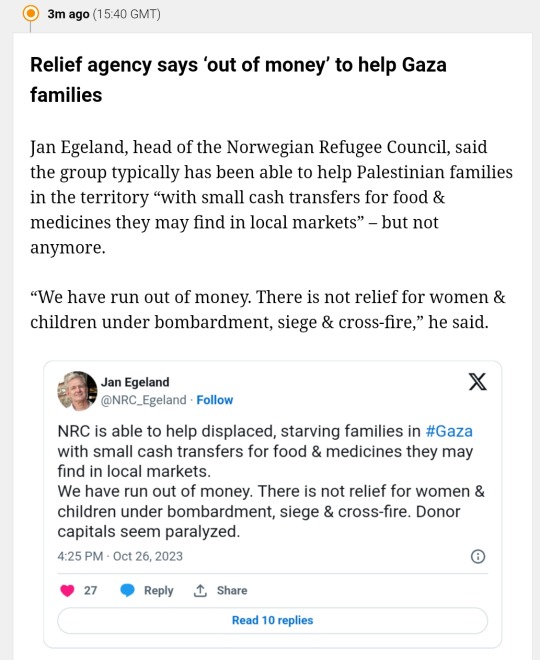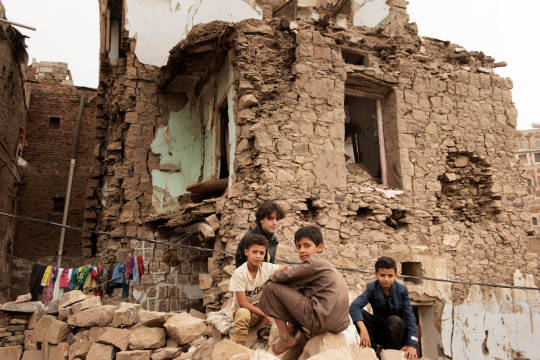#Norwegian Refugee Council
Explore tagged Tumblr posts
Text
#refugees#sudan#sudanese refugees#norwegian refugee council#europe#humanitarian crisis#war and conflict
4 notes
·
View notes
Text

Still no aid through Rafah, children still dying under Israeli terrorism.
#free gaza#gaza strip#irish solidarity with palestine#free palestine#palestine#gaza#news on gaza#al jazeera#boycott israel#israel#Norway#Norwegian refugee council
10 notes
·
View notes
Photo

UN and partners appeal for $116 million as hundreds of thousands flee Somalia to Ethiopia Countries: Ethiopia, Somalia Sources: GOAL, Norwegian Refugee Council, UN Children's Fund, UN High Commissioner for Refugees, United Nations Population Fund, World Food Programme The humanitarian situation on the ground is dire, with moderate acute malnutrition observed in many children under five and in pregnant and nursing mothers. There is a high risk of disease outbreaks. https://reliefweb.int/report/ethiopia/hundreds-thousands-flee-somalia-ethiopia-un-and-partners-call-urgent-funding
#Ethiopia#Somalia#GOAL#Norwegian Refugee Council#UN Children's Fund#UN High Commissioner for Refugees#United Nations Population Fund#World Food Programme#Education#Food and Nutrition#Health#Protection and Human Rights#Shelter and Non-Food Items#News and Press Release#ReliefWeb - Updates (Headlines)
0 notes
Text
I've seen resources for Turkiye, but does anyone know of any reliable rescue responses for Syria?
#Syria#Wikipedia says the#Norwegian Refugee Council#is mobilizing there but I don't know much about them#earthquake
0 notes
Text
CONSULTANCY SERVICES FOR EVALUATION OF THE GRADUATION APPROACH PROGRAM FOR VULNERABLE HOUSEHOLDS IN TURKANA COUNTY
NORWEGIAN REFUGEE COUNCIL TENDER FEBRUARY 2024 TENDER NOTICE CONSULTANCY SERVICES FOR EVALUATION OF THE GRADUATION APPROACH PROGRAM FOR VULNERABLE HOUSEHOLDS IN TURKANA COUNTY The Norwegian Refugee Council (NRC) is a non-governmental, humanitarian organization with 60 years of experience in helping to create a safer and more dignified life for refugees and internally displaced people. NRC…

View On WordPress
0 notes
Text
Gaza’s water and sewage treatment facilities also require electricity and fuel. Without them—and with airstrikes ongoing—sewage is flowing into the Mediterranean Sea. According to the Norwegian Refugee Council, more than 130,000 cubic meters of untreated sewage a day were released into the Mediterranean Sea from Gaza in October, with dire consequences for the environment.
These latest developments are pounding Gazan ecosystems that had already been experiencing severe environmental degradation for decades. For instance, while there are some wastewater treatment facilities in the West Bank, the situation was dire in the Gaza Strip even before the current outbreak of violence, because of the Israeli blockade. That blockade has been near total since 2007, and has restricted the entry of materials and fuel needed for infrastructure. Wastewater management infrastructure is outdated, and sewage polluted Gaza’s aquifer and coastal waters. Some 97 percent of Gaza’s water is unsuitable for human consumption, and polluted water is the source of 26 percent of all illnesses—and before the war, the leading cause of child death in the territory.
Poor water quality and quantity are not only a result of Israel’s targeted policies and the unequal distribution of resources. They are also side effects of the destruction of Gaza’s already flimsy infrastructure during rounds of conflict over the last decade and a half. For instance, in 2007, a river of sewage overflowed in the Gazan village of Umm Naser from a collapsed earth embankment, killing five people. Corruption in the Palestinian Authority and Hamas helped cause the disaster, but an even bigger cause was Israel’s massive, sustained bombing attack on Gaza in the summer of 2006, which led to the destruction of sewage treatment facilities and infrastructure in Gaza.
While the 2006 conflict was devastating, it pales in comparison to the current assault. It is estimated that Israel dropped 25,000 metric tons of bombs on Gaza in the first month of this year’s war, a weight equal to the two nuclear bombs (combined) dropped on Hiroshima and Nagasaki in World War II. The bombs have struck 12,000 targets, the majority of which appear to have served a civilian purpose. “
527 notes
·
View notes
Text
Due to the Israeli blockade, Palestinians in the Gaza Strip can only eat one meal every two days. 🚨

In a statement published by UNRWA regarding the food needs of Palestinians in Gaza, the UN agency mentioned that Gaza's residents are eating only one meal every two days. Meanwhile, the Norwegian Refugee Council confirmed that 83% of the needed food aid cannot be delivered to the Strip. Earlier, the head of the bakery board in Gaza City warned of the return of the specter of famine in northern Gaza after the emergence of a bread production crisis due to the shutdown of 5 out of 6 bakeries in the northern part of the Strip.
‼️ Every small contribution makes a big difference. Help me save my family and rebuild our lives. ‼️
Vatted : @moayesh @el-shab-hussein @nabulsi
#free gaza#gazaunderattack#palestinian genocide#save palestine#free palestine#all eyes on palestine#gaza genocide#news on gaza#save gaza#gaza#gaza gofundme#gaza fundraiser#stand with gaza#help gaza#gaza strip#palestine genocide#palestine fundraiser#support palestine#palestine news#i stand with palestine#palestine gfm#palestine resources
121 notes
·
View notes
Text
Sudan’s rival generals have ignored warnings of mass starvation. In more than a year of brutal war, the two military factions have weaponized humanitarian aid.
Sudan’s de facto leader, military chief Abdel Fattah al-Burhan, has blocked aid into at least half of the country under the control of the paramilitary Rapid Support Forces (RSF) headed by Mohamed Hamdan Dagalo, known as Hemeti. Meanwhile, the RSF is obstructing trucks into places held by the Sudanese Armed Forces (SAF). Local volunteers running soup kitchens have been targeted and killed by the RSF, particularly in Khartoum, Sudanese aid workers told FP.
The conflict has created the world’s largest hunger and internal displacement crises. The fighting has pushed 25 million people, more than half the nation’s population, into acute hunger and forced about 11 million people to flee their homes, including 2.3 million who fled abroad. More than two million Sudanese could die by the end of this year, aid agencies warn.
In areas where there is food available, extortion and attacks on traders at checkpoints have raised prices. Women have recounted having sex with SAF soldiers in exchange for food. Reports of torture, rape, the use of children under 15 in the fighting, and ethnic-based massacres by the RSF and armed militias have surged over the past year.
“People are dying of hunger in the capital,” said Mathilde Vu, the Norwegian Refugee Council’s advocacy advisor in Sudan. “We are looking at the risk of starvation being used as a weapon of war. … This needs to be monitored. The policymakers already have a tool for that. The U.N. Security Council resolution about conflict and hunger, and what they need to put in place is a monitoring of that.”
Both sides in Sudan’s nearly 17-month civil war have committed “harrowing” abuses that may amount to war crimes, a U.N.-mandated mission reported on Friday, calling for a countrywide arms embargo. Sudan’s military government rejected a proposal by U.N. experts to deploy a peacekeeping force to protect civilians.
Compounding the situation, the humanitarian response is critically underfunded. A $2.7 billion U.N. appeal has been just 32 percent funded. Much of that funding has come from the United States. However, aid agencies say local volunteers on the ground need to be better supported since a cease-fire is highly unlikely in the immediate future.
Famine was declared in Zamzam camp housing about 500,000 displaced people near the besieged city of El Fasher, the state capital of North Darfur—areas where the RSF is blocking aid trucks. There’s a realistic chance of famine in 16 other areas, Vu said, but precise figures are hard to confirm. Last month, the SAF agreed to open the Adré border crossing from landlocked Chad into Sudan, for a period of three months. But international aid agencies told FP that the SAF has made things difficult through lengthy authorizations ensuring only a trickle of shipments gets in.
U.S. envoy for Sudan Tom Perriello visited Saudi Arabia, Egypt, and Turkey this week in the latest attempt by the Biden administration to expand humanitarian access in Sudan, following failed peace talks in Geneva. The conflict risks turning into a forever war, in which various external actors seize the opportunity to extend their influence. Turkey, Egypt, the United Arab Emirates (UAE), and Russia have been accused of arming warring parties.
While such negotiations are essential, U.S. attention and pressure should also focus on other regional powers with a vested interest in the conflict such as Eritrea and Ethiopia. Foreign mercenaries from Chad, Mali, Niger, the Central African Republic, and Libya are believed to be fighting in Sudan.
Pressuring regional powers could engage local armed militias allied to the warring parties in ultimately ensuring access to places like El Fasher. “It will create more of a buffer than two guys signing an agreement in Jeddah” and then breaking it, Vu said. “You cannot bypass the regional powers. … They really are the ones who have the leverage. It’s very important that Western powers engage them so that they have a constructive role in this crisis rather than a harmful one,” she added. Even if Burhan and Hemeti signed a peace deal, many of the local armed groups involved would likely not abide by it.
Both generals have held meetings with several African leaders, while the African Union has been largely absent in peace negotiations. More recently, Burhan held meetings with Eritrea’s president, Isaias Afwerki, and Ethiopia’s prime minister, Abiy Ahmed, at the China-Africa summit.
69 notes
·
View notes
Text
‘Almost unparalleled suffering’ in Gaza as UN says nearly 70% of those killed are women and children | Global development | The Guardian
#united nations#gaza strip#free gaza#gaza genocide#gazaunderattack#gaza#palestine news#free palestine#save palestine#palestinian genocide#all eyes on palestine#israel hamas war#israeli apartheid#israel#idf#us politics
22 notes
·
View notes
Text
Countries supporting Israel with arms have a “permanent stain on their reputation”, the head of the Norwegian Refugee Council, a major aid agency, has said in a statement.
While condemning the 7 Octobuer attack on Israel by Hamas and demanding the release of hostages held by the militant group, Jan Egeland said Israel’s military campaign “can in no way be described as ‘self-defense.’” He said:
The pulverising of Gaza now ranks amongst the worst assaults on any civilian population in our time and age. Each day we see more dead children and new depths of suffering for the innocent people enduring this hell …
Countries supporting Israel with arms must understand that these civilian deaths will be a permanent stain on their reputation.
They must demand an immediate ceasefire in Israel and Gaza. Only a cessation of hostilities will allow us to ensure effective relief to the two million who now require it.
68 notes
·
View notes
Text
#norwegian refugee council#displaced persons#refugees#displacement crises#burkino faso#international issues
4 notes
·
View notes
Text

The Norwegian Refugee Council has run out of money to help Gazan families
#free gaza#free palestine#gaza strip#irish solidarity with palestine#palestine#gaza#news on gaza#al jazeera#boycott israel#israel#Norwegian Refugee Council#Jan Egeland
4 notes
·
View notes
Photo

More than 140 NGOs call for parties to Yemen conflict to restore and renew truce and build lasting peace Country: Yemen Sources: ACTED, Action Contre la Faim France, Action for Humanity, Adventist Development and Relief Agency International, CARE, Caritas, Danish Refugee Council, Handicap International - Humanity & Inclusion, International Rescue Committee, INTERSOS, Islamic Relief, MedGlobal, Mercy Corps, Norwegian People's Aid, Norwegian Refugee Council, Oxfam, People in Need, Polish Humanitarian Action - Polska Akcja Humanitarna, Première Urgence Internationale, Qatar Charity, Relief International, Saferworld, Save the Children, Vision Hope International, War Child International, ZOA "The six-month truce shifted Yemen into a new phase, one that could represent the beginning of the end of this conflict. We call on you to ensure this opportunity grows into lasting peace and promise." https://reliefweb.int/report/yemen/open-letter-yemeni-parties-conflict-141-ngos-restore-and-renew-truce-and-build-lasting-peace-enar
#Yemen#ACTED#Action Contre la Faim France#Action for Humanity#Adventist Development and Relief Agency International#CARE#Caritas#Danish Refugee Council#Handicap International - Humanity & Inclusion#International Rescue Committee#INTERSOS#Islamic Relief#MedGlobal#Mercy Corps#Norwegian People's Aid#Norwegian Refugee Council#Oxfam#People in Need#Polish Humanitarian Action - Polska Akcja Humanitarna#Première Urgence Internationale#Qatar Charity#Relief International#Saferworld#Save the Children#Vision Hope International#War Child International#ZOA#Peacekeeping and Peacebuilding#Protection and Human Rights#News and Press Release
0 notes
Text
The Norwegian Refugee Council recently released a report highlighting the 10 most neglected displacement crises in the world in 2023. Nine of the 10 countries are in Africa – the only non-African country on the list is Honduras in central America.
Neglect, according to the council, is characterised by a lack of media coverage, inadequate humanitarian funding and insufficient international political attention. The report covers those forced to flee their homes.
Burkina Faso tops the 2024 report for a second time in a row. It’s followed by Cameroon, the Democratic Republic of Congo (DRC), Mali and Niger. Rounding off the top 10 are South Sudan, the Central African Republic, Chad and Sudan.
At The Conversation Africa, we’ve been working with academic experts to highlight the severe insecurity, massive displacement and urgent need for international and regional support in these countries. Here are some essential reads we’ve published.
Displacement crisis
The central African region hosts one of the largest communities of internally displaced persons in Africa. The countries in the region include Cameroon, the Central African Republic and the DRC. Long-running conflicts and armed rebellions have led to the region’s instability. The main organisation providing assistance is the UN refugee agency. However, in a pattern seen for at least three years, the agency’s budget for the region remains insufficient. Cristiano d'Orsi highlights the urgent need for a coordinated and sustained international response.
Regional instability
Armed groups like Boko Haram have been operating in the Lake Chad Basin for more than a decade. The region, which includes Niger, Cameroon and Chad, faces severe security challenges and many of the 30 million people living here need humanitarian assistance. More than 11 million have been displaced by conflict and need aid. Modesta Tochukwu Alozie proposes some solutions for a region whose population is expected to double in the next two decades.
Decades of neglect
Thirty years of violence in the DRC have left a trail of death, destruction and displacement. In recent months, however, a rebel insurgence in the eastern region has placed neighbouring Rwanda and Uganda at the centre of country’s conflict. According to Jason Stearns and Joshua Z. Walker, donors and UN peacekeepers are providing humanitarian aid, but doing little to address the emerging conflict dynamics. They explain why resolving the DRC crisis requires less hypocrisy from foreign donors, and an approach that prioritises the lives of civilians.
Military takeover
Niger is one of the poorest countries in the world and depends on foreign assistance. It’s also located in one of the most unstable parts of the world – the Sahel region, which is characterised by terrorism, banditry and trafficking. However, following a military coup in July 2023, the landlocked country of 25 million people lost significant aid contributions. This has since resulted in a deterioration in security, economic development and people’s wellbeing. Olayinka Ajala unpacks the long-ranging implications of the military takeover in Niger.
Escalating conflict
Sudan was on a bumpy transition to democracy after the 2019 uprisings ousted long-time dictator Omar al-Bashir. But this came to a halt in April 2023 with the outbreak of a civil war. Hostilities have since spread beyond the capital Khartoum and revived long-simmering violence in Darfur. Around 25 million people – half of Sudan’s population before the war – are in need of urgent humanitarian assistance. The war is creating a volatile environment beyond Sudan’s borders, as May Darwich explains.
Precarious peace
South Sudan gained independence in 2011 but remains extremely poor and underdeveloped. The country is reliant on oil exports for public revenue. This oil has to pass through Sudan to reach export markets. However, Sudan’s ongoing war poses a serious threat to Juba’s development efforts and an already precarious peace process. John Mukum Mbaku puts these risks into context.
15 notes
·
View notes
Text




─ •✧ WILLIAM'S YEAR IN REVIEW : MARCH ✧• ─
1 MARCH - William was accompanied by Catherine for presenting Leeks to the Welsh Guards during the 1st Battalion Welsh Guards St. David's Day Parade at Combermere Barracks. 2 MARCH - William and Catherine received The Crown Prince and Princess of Norway at Windsor Castle. They later held a Meeting with Norwegian business delegates accompanied by the Crown Prince Couple. 6 MARCH - He chaired a Meeting of The Prince's Council. 7 MARCH - William held an Investiture at Windsor Castle. 9 MARCH - William and Catherine were received by Ms. Manju Malhi (Deputy Lieutenant of Greater London) at the Hayes Muslim Centre in Middlesex. 10 MARCH - He received Ms. Hannah Jones (Chief Executive, Earthshot Prize) at Windsor Castle. 13 MARCH - William and Catherine attended the Commonwealth Service in Westminster Abbey. Afterwards, he attended the Commonwealth Day Reception at Buckingham Palace. 14 MARCH - William held a Meeting at Windsor Castle. 16 MARCH - William held an Investiture at Windsor Castle. Afterwards, he visited Aston Villa FC at Bodymoor Heath. 17 MARCH - William accompanied Catherine in presenting Shamrocks to Irish Guards as they attended the 1st Battalion Irish Guards' St. Patrick's Day Parade in Aldershot. He appeared in a TV special with Groundswell for Red Nose Day. 19 MARCH - William wrote a letter to Alpha United Juniors condemning the incidents of racism being faced by their players. 20 MARCH - He received Mr. Alastair Martin (Secretary of the Duchy of Cornwall) at Windsor Castle. 21 MARCH - William held a Meeting with Rodrigo Garcia Gonzalez & Pierre-Yves Paslier (Founders, NotPla) 22 MARCH - William departed Royal Air Force Northolt for Poland where he was by His Majesty's Ambassador to the Republic of Poland (Her Excellency Ms. Anna Clunes) upon arrival at Rzeszow-Jasionka International Airport. He met British troops at the Airport. Afterwards, he visited a Rzeszow Military Base in and visited British troops providing support to Poland and Ukraine. Subsequently, William met Ukrainian refugees living in temporary accommodation in Warsaw. In the evening, he was spotted at Butero Bistro having dinner. 23 MARCH - William laid a wreath at the Tomb of the Unknown Soldier at Plac Marszalka Józefa Pilsudskiego and called upon The President of the Republic of Poland at the President's Chancellery. Afterwards, he met Ukrainian refugees at Hala Koszyki. Subsequently, subsequently he met Ukrainian staff from the British Embassy in Kyiv at Hala Koszyki. After completing his visit to Poland, William arrived at the Royal Air Force Northolt from Poland. 24 MARCH - William approved the appointment of the High Sheriff of Cornwall (Mr Toby George Howell Ashworth)
#british royal family#british royals#royalty#brf#royals#royal#british royalty#duke of cambridge#prince of wales#the prince of wales#prince william#royaltyedit#royalty edit#year in review 2023 : catherine#year in review : 2023#william review : march#year in review : william#review 2023#review march#kate middleton#catherine middleton#duchess of cambridge#princess of wales#the princess of wales#princess catherine#princess kate#my photoset#my edit
45 notes
·
View notes
Text
Endless number of food aid trucks sitting, waiting at the border in Rafah to go into Gaza, stopped and consistently denied entry by Israel.
This is Sadistic forced starvation.
Decolonise Palestine 🇵🇸🕊🍉🫒🍉🫒🍉🫒🍉🫒🍉🫒🍉🕊🇵🇸
Decolonise Palestine
#Palestine#Free Palestine#Gaza#Free Gaza#Food aid#Food aid trucks#Aid tricks#Rafah#Human rights#Human rights violations#Israel is a terrorist state#Israel#Watermelon 🍉#🍉 🇵🇸#Decolonise Palestine#Ceasefire#Ceasefire now#Forced starvation
22 notes
·
View notes